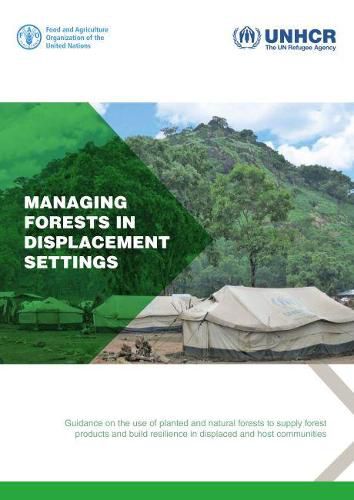Readings Newsletter
Become a Readings Member to make your shopping experience even easier.
Sign in or sign up for free!
You’re not far away from qualifying for FREE standard shipping within Australia
You’ve qualified for FREE standard shipping within Australia
The cart is loading…






This document provides guidance on the management of natural and planted forests and woodlands in displacement settings, taking into account different indicators, including wood fuel demand and supply; land suitability; land tenure; livelihood opportunities; the prerequisites of suitable nursery and plantation sites; tree species selection; nursery establishment and management; plantation establishment and management; and monitoring, evaluation and reporting.
The massive increase in demand for woodfuel for cooking caused by sudden influxes of refugees and other displaced people is usually the main driver of forest degradation and deforestation in displacement settings. It places enormous pressure on nearby forests and woodlands and is often a source of tension between the host and displaced communities. A lack of sufficient cooking fuel also has an impact on the nutrition and health of vulnerable people in such settings.
A planning approach to the use of forest resources is crucial for building resilience and enabling sustainable development in both displaced and host communities. In particular, well-planned forestry interventions can ensure a sustainable supply of woodfuel, timber and non-wood forest products for those communities, fostering their well-being. Forests and trees also underpin core ecosystem services such as freshwater supply, soil stability and fertility, agro-biodiversity and biodiversity conservation, all of which contribute to the resilience of communities.
$9.00 standard shipping within Australia
FREE standard shipping within Australia for orders over $100.00
Express & International shipping calculated at checkout
This document provides guidance on the management of natural and planted forests and woodlands in displacement settings, taking into account different indicators, including wood fuel demand and supply; land suitability; land tenure; livelihood opportunities; the prerequisites of suitable nursery and plantation sites; tree species selection; nursery establishment and management; plantation establishment and management; and monitoring, evaluation and reporting.
The massive increase in demand for woodfuel for cooking caused by sudden influxes of refugees and other displaced people is usually the main driver of forest degradation and deforestation in displacement settings. It places enormous pressure on nearby forests and woodlands and is often a source of tension between the host and displaced communities. A lack of sufficient cooking fuel also has an impact on the nutrition and health of vulnerable people in such settings.
A planning approach to the use of forest resources is crucial for building resilience and enabling sustainable development in both displaced and host communities. In particular, well-planned forestry interventions can ensure a sustainable supply of woodfuel, timber and non-wood forest products for those communities, fostering their well-being. Forests and trees also underpin core ecosystem services such as freshwater supply, soil stability and fertility, agro-biodiversity and biodiversity conservation, all of which contribute to the resilience of communities.